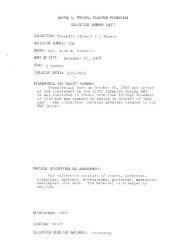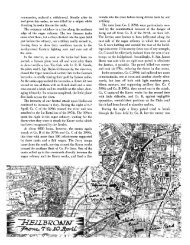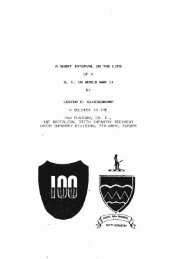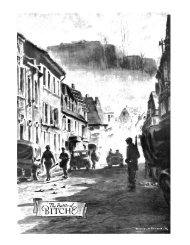Joint Operating Concept (JOC) - GlobalSecurity.org
Joint Operating Concept (JOC) - GlobalSecurity.org
Joint Operating Concept (JOC) - GlobalSecurity.org
Create successful ePaper yourself
Turn your PDF publications into a flip-book with our unique Google optimized e-Paper software.
other conflict was predominantly an information war characterized by<br />
psychological actions by the Front de Liberation Nationale and reactions by the<br />
French. 33 Ultimately the French counterinsurgency effort was tactically<br />
successful in terms of isolating the insurgents from re-supply and reinforcement<br />
(border control), bringing security to key infrastructure and populated areas,<br />
and wearing the insurgents down by hunting down insurgent fighters.<br />
Unfortunately, by the time this eventually occurred, France agreed to a peace<br />
accord that granted Algeria its independence in 1962 with no transitional<br />
measures in place in order to maintain stability. There are many lessons to be<br />
learned here, both at the tactical and strategic levels. The French use of small,<br />
mobile forces and larger, stationary forces is a model for other<br />
counterinsurgency efforts. However, perhaps the most important lesson is that<br />
the levels of war are inextricably linked (or should be), and that a tactical victory<br />
is hollow without the strategic vision and political will to capitalize upon it.<br />
The Vietnam War (1960 - 1975). This lengthy war provides a valuable case<br />
study in the US approach to countering future irregular threats. As in every<br />
conflict, there are plenty of good and bad lessons to learn from the intervention<br />
effort. Vietnam showed that the American military’s bias for mounting largescale<br />
combat operations with large troop formations and reliance on massive<br />
combined arms in order to dominate the adversary was not always appropriate.<br />
As in most irregular wars, the adversary seized on the advantages of using this<br />
asymmetry to his advantage and thereby precluded the US military from being<br />
able to take full advantage of its enormous arsenal. A particularly important<br />
lesson from the Vietnam experience was the effectiveness, and ultimately the<br />
necessity, of the military working with OGAs. Where other purely military efforts<br />
failed to bring a long-term stability or to counter the communist insurgency, the<br />
IA activities brought about a measure of stability, moral legitimacy, and some<br />
indigenous capacity to South Vietnam and its government forces.<br />
El Salvador War (1980 - 1992). The war in El Salvador was a near classic<br />
case of insurgency and counterinsurgency. The people were aroused to the point<br />
of insurrection by a relatively small elite. As usually occurs in a case such as<br />
this, the Government of El Salvador reacted inappropriately. However,<br />
something rather unusual occurred in this case; the regime listened to the<br />
issues that the people voiced as their reasons for rebellion and made sweeping<br />
changes that irked the conservatives among the non-rebelling elite while not<br />
going far enough for the liberal elites who had incited the rebellion in the first<br />
place. However, the compromise seemed to serve the government well—the<br />
primary catalytic agents for insurrection no longer existed and the population<br />
started to lose interest. Unfortunately for the rebellion, the insurgency<br />
continued without the real support of the populace. The Salvadorian military<br />
was able to win most tactical engagements in the field and Duarte ensured that<br />
his military cleaned up their civil rights abuses. This rectification of civil rights<br />
33 Alf Andrew Heggoy, Insurgency and Counterinsurgency in Algeria, (Bloomington, IN: Indiana<br />
University Press, 1972), p. 172.<br />
Appendix G<br />
G-3
















